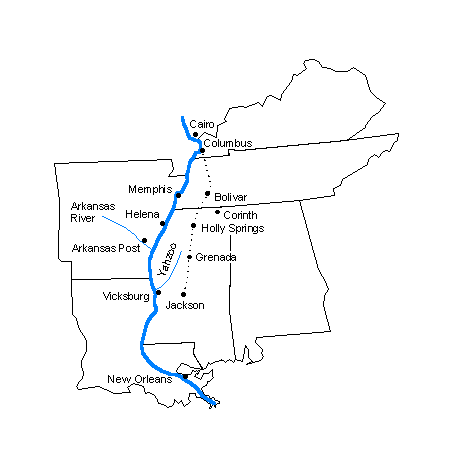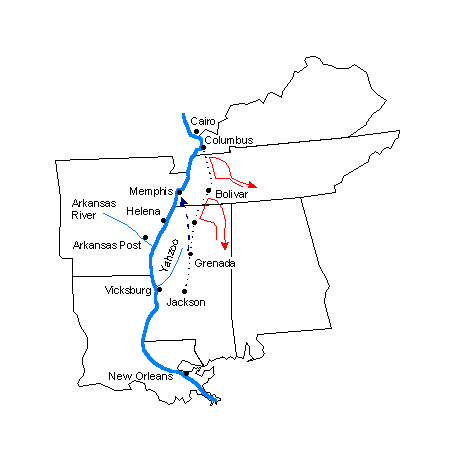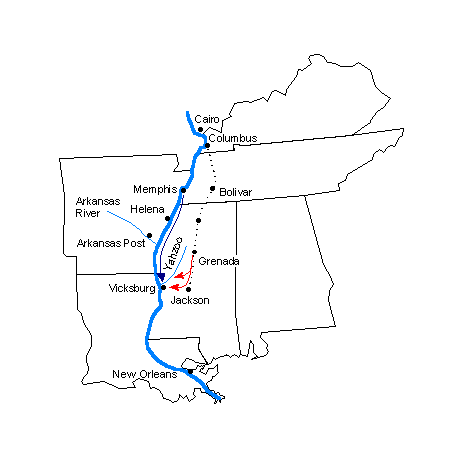 |
"Vicksburg is the key. The war can never be brought to a close until the key is in our pocket. We can take all the northern parts of the Confederacy, and they still can defy us from Vicksburg. It means ... fresh troops from the states of the far south, and a cotton country where they can raise the staple without interference."
-- President Abraham Lincoln.
"Vicksburg is the nailhead that [holds] the South's two halves together."
-- President Jefferson Davis.
"Vicksburg is daily growing stronger. We intend to hold it."
-- Lieutenant General John S. Pemberton, dispatch to Richmond, January 1862.
Principal Engagements and Battles
| Engagement / Battle * | Date | Victor | Impact | Total Casualties |
|---|---|---|---|---|
| Lexington, Tennessee | 18 December | Confederate | Negligible | ? |
| Holly Springs, Mississippi | 20 December | Confederate | Decisive | ? |
| Chickasaw Bayou (Chickasaw Bluffs) | 26 - 29 December | Confederate | Major | 1,983 |
| Parker's Cross Roads | 31 December | Confederate | Minor | 737 |
| Arkansas Post (Fort Hindman) | 9 - 11 January | Union | Minor | 6,547 |
*The North and South often had different names for the same battles. Northerners, with better access to maps, often named battles after the closest physical feature. Southerners, from more rural backgrounds and lacking maps, often referenced locations by the nearest town, village, or community. Other names for battles are listed in parentheses.
Background
Following the defeat of Corinth, Mississippi in May of 1862, federal troops held areas of west Tennessee and northwestern Mississippi, but only along the Mississippi River. Confederate Cavalry under Brigadier General Nathan Bedford Forrest still operated further inland in Tennessee, operating out of Columbia. Major General Earl Van Dorn (recently replaced as commander of the Army of Mississippi by Lieutenant General John S. Pemberton) commanded an independent Confederate force in northwestern Mississippi, and Pemberton held the Vicksburg environs further south. Headquartered in Jackson, he was forty miles to the east of the "Gibralter of the West" as Vicksburg was called.
Taking Vicksburg was the key to Union success in the west, and it could not be rushed. But an unfortunate campaign was waged prematurely due to a rivalry between Major General John A. McClerland, a politician turned general, and Lieutenant General Ulysses S. Grant, who was in command of the District of West Tennessee. McClerland had served under Grant since the early Union victories at Belmont, Fort Henry, and Fort Donelson. Ambitious, selfish, and pompous, McClerland shared in the credit for those battles. But he resented West Pointers and once complained to Washington that he was tired of supplying the brains for Grant's Army. On a fast track to the White House, McClerland wanted to do something that would make headlines. The most obvious choice was Vicksburg. However, there was one obstacle in his path -- Grant. The two generals viewed an attack on Vicksburg in very different lights. To Grant, it was the most important strategic prize of the war, even more important than Atlanta or Richmond. Whoever controlled Vicksburg controlled the Mississippi River and possibly the center of the entire continent. To McClerland, Vicksburg was simply the key to his political aspirations. Grant distrusted McClerland's abilities and temperment, and McClerland saw Grant only as an impediment to his rising fame.
 |
Gaining support from his good friend President Lincoln and the Secretary of War, McClerland was able to obtain permission to recruit an army from Indiana and Ohio to descend on Vicksburg. McClerland moved to Cairo and proceeded with his recruitment, while Grant questioned General-in-Chief Henry W. Halleck as to who was actually in charge. Halleck replied that Grant was in command of all armies in his department and had permission to attack where he pleased. That was all Grant needed to hear, and decided to beat McClerland to Vicksburg. He planned to march south from Grand Junction, Tennessee (forty miles east of Memphis) with 36,000 troops to repair the Mississippi Central Railroad at Holly Springs. With an adequate means to supply his troops, he would then move through northwestern Mississippi and take the city of Jackson, hoping to draw all the Confederates out, then move on Vickburg from the east.
Operations
Confederate Major General Earl Van Dorn stood in Grant's way. He had been stationed at Holly Springs -- approximately 25 miles south of Grant -- but had abondoned the camp and moved across the Tallahatchie River, throwing up earthworks to cover the crossings. Grant decided to flank Van Dorn from the west. He almost succeeded, but at the last moment Van Dorn discovered the threat and quickly retreated to Grenada, halfway between Grant's original position and Vicksburg. By mid-November Grant was in Holly Springs. His movements had been rapid and well-cordinated, and had encountered little Confederate resistance.
 |
But Grant worried that McClerland would complete his recruiting, then attack down the river at the head of his army of new volunteers. With Grant drawing Pemberton's forces away from Vicksburg, he would only pave the way for an easy victory by McClerland. So, Grant turned to an old friend for help -- Major General William T. Sherman. Tall, red-headed Sherman was figety and wore a scraggly, close-cropped beard. He had once been declared insane because he had said the war would be a long and bloody affair, and had once even sought psychiatric help. "I never saw him but I thought of Lazarus," somone once remarked of Sherman. But he and Grant had become close friends following the Battle of Shiloh, and he was happy to help.
Grant had decided to pre-empt any move McClerland could make by sending Sherman down the river instead. Once the rail depot at Holly Springs was repaired and restocked, Sherman would move down the river to the mouth of the Yazoo river with his corps of 33,000 men. Supported by Rear Admiral David A. Porter's gunboats, they would take the high ground northeast of Vicksburg while Grant moved overland. The plan was risky at best, with two widely separated forces attempting to coordinate a simultaneous attack without communication. Grant's supply line would be a thin and very vulnerable line of track stretching over 200 miles, and the ground Sherman was to take -- the Walnut Hills -- were heavily defended. But Grant felt a determined commander such as Sherman could swarm over the low-lying hills in one day. Sherman returned to Memphis and, supported by Porter, departed. Grant moved south to Grenada, which ahd recently been vacated by the Confederates for an unknown reason, and prepared to move overland. But before Grant could move the Confederates struck.
 |
The attacks came from a pair of tenacious Confederate cavalry commanders operating east of the Mississippi Central Railroad in Tennessee and Mississippi -- Van Dorn and Forrest. Van Dorn had been a promising star at the beginning of the war, but had suffered a series of setbacks. Most notably, he had been held responsible for the loss of Corinth, and had been brought up on charges. Ambitious, a talented field commander, and certainly lacking no courage under fire; he had failed to perform through a lack of logistical skills, poor planning abilities, and suspect judgement. But he was a capable cavalry commander who had been out of his element as a departmental commander of large ground troops. Recently he had been replaced by Pemberton and reassigned to the cavalry. It would prove to be highly fortuitous to the Confederates. For it was because of Van Dorn that Grenada had been evacuated unexpectedly -- to concentrate forces to the east for a flanking movement on Grant's supply line. On 20 December, Van Dorn with three cavalry brigades of 3,500 men under his new command, roared into Holly Springs and destroyed the main supply depot. He followed the railroad north to just below Bolivar, Tennesse, skirmishing with Grant's rearguard before returning to his base.
 |
Click here for details about Van Dorn's Cavalry Raid |
Grant was mortified at the loss of Holly Springs and all its supplies. But even worse news was to come, when he found out that Forrest was tearing through Tennessee. Not part of the military elite, Forrest was from the wild Tennessee frontier, and had risen to generalship through sheer grit and homespun practicality. Both Grant and Sherman would cringe whenever they knew the Confederate raider was nearby. A friend of Grant's once remarked that Forrest, "... was amenable to no known rules of procedure, was a law unto himself for all military acts, and was constantly doing the unexpected at all times and places." Not someone to be trifled with, his non-military background may have given him a decided edge. Much as it would when he slipped across the Tennessee River on 10 December.
Over the course of three weeks, Forrest played havoc with the Union rearguard in the region. When the dust had settled, he had wrecked over sixty miles of railroad that was absolutely vital to Grant, at numerous points northward all the way to the Kentucky border, winning numerous skirmishes and the Battles of Lexington and Parker's Cross Roads. Van Dorn had destroyed all Grant's supplies on hand and Forrest had made it impossible for him to bring up more. Grant had no choice but to suspend his advance, and subsequently withdrew to Memphis, sadly leaving Sherman alone to salvage his unravelling campaign.
 |
Click here for details about Forrest's Cavalry Raid |
Meanwhile, Sherman and Porter were boarding transports on the same day that Van Dorn was destroying the depot at Holly Springs. Since the telegraph had been cut, Grant could not inform Sherman and Porter of his sudden withdrawal from Northern Mississippi. They would not learn Grant had turned back until after they had reached their destination and attacked the Confederate line. Picking up volunteers in Helena, they continued down the river. The volunteers had been recruited by McClerland for his independent command, but Grant felt unleashed by Halleck's words that all troops in his department were under his command. On the Confederate side, Pemberton was no longer concerned about a threat from Grant, and began rushing reinforcements to Vicksburg. It wasn't hard for him to learn where the attack might come.
 |
In early December, Porter had sent three ironclads and two tin-clads (offering protection from musket fire only) to clear the Yazoo River. On 12 December, the naval reconnaisance began shelling the banks, and fishing out torpedoes and five-gallon whisky bottles packed with powder (called demijohns) sunk a few feet below the muddy water. They cleared 23 miles of the winding river up to Haines Bluff. There the ironclad Cairo came in contact with a one of the demijohns and in eight minutes rested on the river bed 30 feet below, with only the tips of her stacks extending above the waterline.
On 24 December 1863, the flotilla of seven gunboats and fifty-nine transports under Porter's command, carrying Sherman and his troops, arrived just above Vicksburg at Milliken's Bend. The next day they moved up the Yazoo River and Sherman landed at Johnson's Plantation. From 26-27 December Sherman moved slowly inland toward the Walnut Hills. By then Confederate reinforcements had arrived until 14,000 men manned the bluffs, and the stage was set for a devastating Union defeat at Chickasaw Bayou.
 |
Click here for details about the Battle of Chickasaw Bayou |
After this defeat, Sherman searched for a way to balance his loss. During the battle, a federal river steamer carrying supplies down the Mississippi had been captured as it passed the mouth of the Arkansas River. Forty miles up the Arkansas River was Arkansas Post, built before the American Revolution. Nearby, the Confederates had build a fortification called Fort Hindman. From there they descended on Federal river traffic, easily retreating back to saftey. It gave Sherman the opportunity he needed.
 |
McClerland had since arrived, decidedly unhappy of having his recruits pulled out from under him. Being the senior officer, he took command of the newly-formed Army of Mississippi, one of four in Grant's reorganized department. He began talking expansively about clearing the Misssissippi of rebels, but he had no clear idea of where to start. Sherman did. He approached his new commander with a battle plan. Sherman was now one of two divisional comanders under McClerland. He proposed taking his half of the army, and with the assitance of Porter, move up the Arkansas River and take the Confederate fortification at Arkansas Post. This would protect the river from future Confederate attacks when another full-scale campaign against Vicksburg was sure to be waged.
McClerland didn't think much of the idea -- he had no blemished record to restore -- but he agreed that he and Sherman should meet with Porter to discuss the idea. Porter didn't think much of it at first either, but realizing he also had a blemish on his record, agreed to help personally. McClerland suddenly had a change of heart, and decided to lead the attack with the whole army. While he had suffered no defeat, he had no victories as commander of his new army. A victory at Arkansas Post would start him well on the way along his political path. After three days of peparation, and after informing Grant of his intentions, McClerland left Milliken's Bend on 8 January. A day later they were in positon before Fort Hindman and captured it on 11 January. The Union forces captured between seven and ten thousand prisoners, and McClerland could hardly contain his excitement. However, the battle had little military value, certainly not to the level of bombast supplied by McClerland. But at least it served to mitigate an otherwise failed Union campaign.
 |
Click here for details about the Battle of Arkansas Post |
Aftermath
The success of the Confederate cavalry brought a much needed respite in the western theatre and validated their importance. It helped prolong the Confederacy's influence in Tennessee. The blows that Van Dorn and Forrest had struck prior to the Battle of Chickasaw Bayou contributed as much to that southern victory as had the troops on the bluffs. As the fortunes of the western Confederate armies dwindled -- The Army of Mississippi under Pemberton was lost in its entirety with the fall of Vicksburg and the Army of Tennessee, operating in eastern Tennessee and Georgia, suffered many defeats until the end of the war -- Confederate Cavalry would become a shining light in the South's dismal western theatre. Van Dorn would be assassinated only a few months after his stunning raid on Holly Springs for alleged improprieties involving a doctor's wife. But Forrest would go on to become a major thorn in the side of both Grant and Sherman, at one time called being called, "That Devil Forrest," by no less than Sherman himself. While much attention has been given Major General J.E.B. Sturart's Cavalry in the eastern theatre, Grant and Sherman in the west may have faced the tougher cavalry. In his memoirs Sherman left no doubt that in Tennessee and Mississippi he faced the best cavalry in the world.
The Confederate success of the unexpected raid at Holly Springs and Forrest's raids may have cancelled Grant's overland attack toward Vicksburg and forced him to retreat to Memphis, but it gave him a valuable lesson that would serve him well throughout the war. The reason he was so concerned about the vital railroad link, and the stockpiling of supplies, was that he did not yet know a modern army could live off the land. With his supplies destroyed and no way to bring more, he was forced to confiscate the stores of civilians in the surrounding contryside as he retreated. Ordering that most of the food be commandeered for 15 miles in both directions, he was amazed at the ease with which he supplied the needs of an entire army of 40,000 men. Grant regarded this as one of the major lessons he learned during the Civil War. He also learned the impact that the loss of such stores could have on an opposing army. Later in the war he ordered the wholsale destruction of the Shenandoah Valley so the Confederate Army under Robert E. Lee could not be supplied. And it was a lesson that Grant passed on to his trusted friend and subordinate, Sherman, who employed it with vigor as he cut his way through Georgia.
To a man who was so obsessively determined as Grant, his retreat following the loss of Holly Springs must have affected him on a deeply personal level. Vicksburg would finally fall in a great Union victory, but it would be a belated one after much bloodshed. Sherman advised Grant to again approach Vicksburg through Holly Springs along the Mississippi Central Railroad, but Grant would have nothing of it. He instead proceeded with a series of elaborate engineering projects -- building canals and diverting rivers -- finally fighting past the Vicksburg blockade and circling the city to the west and south. He arrived on the more vulnerable eastern side of the well-defended city at the same place he would have had he had attempted to attack through Holly Springs. After a prolonged siege and repeated bombardment that resulted in many civilian as well as military casualties, the city finally fell on 4 July 1863. All because he had had no desire to return to Holly Springs.
|
|
Return to Campaigns |